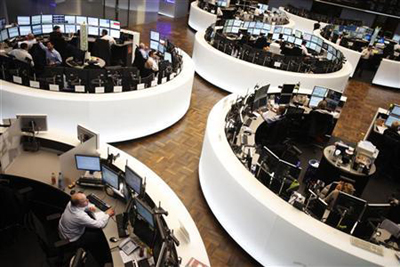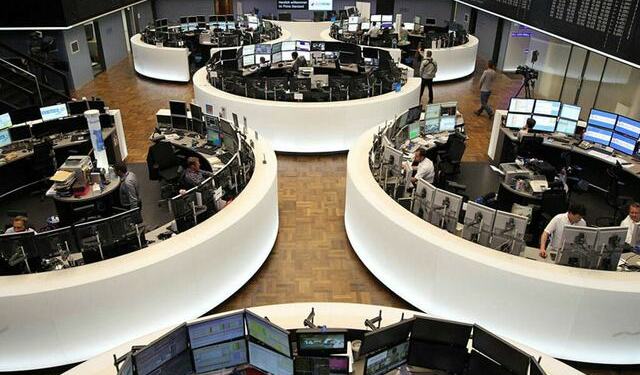Monday, 13 July 2015 21:28
 LONDON: European equities surged higher Monday on news of a long-awaited Greek bailout agreement, but the euro ran out of steam as traders saw calm on the continent boosting chances of a US interest rate hike.
LONDON: European equities surged higher Monday on news of a long-awaited Greek bailout agreement, but the euro ran out of steam as traders saw calm on the continent boosting chances of a US interest rate hike.
The CAC 40 in Paris jumped 1.94 percent higher to 4,998.10 points and Frankfurt’s DAX 30 climbed 1.49 percent to 11,484.38 points.
Milan rose 1.00 percent and Madrid gained 1.70 percent.
Outside the eurozone, London’s FTSE 100 index won 0.97 percent to 6,737.95 points.
Greece reached a desperately-needed bailout deal with the eurozone on Monday after marathon overnight talks, in a historic agreement to prevent the country crashing out of the European single currency.
In reaction, the euro briefly rose to a July peak of $ 1.1216. However, it then fell back to $ 1.1028, down sharply from $ 1.1149 late in New York on Friday.
“The relief rally in the euro was short-lived as investors await details of the Greek agreement,” said Nick Stamenkovic, macro strategist at RIA Capital Markets.
The euro also failed to benefit because the Greek deal made it more likely the US Federal Reserve would raise interest rates soon, dealers said.
“Whilst equity investors have been buoyed by the general concept of agreement, currency investors are more cautious, as a deal on Greece now removes one of the key obstacles which might have prevented the Fed from actively considering imminent US interest rate rises,” said analyst Rebecca O’Keefe at broker Interactive Investor.
“The removal of this barrier — combined with signs that the Chinese equity market is also stabilising — could allow the Federal Reserve to raise rates more quickly and this is putting pressure on the euro,” she told AFP.
Julian Jessop, chief global economist at Capital Economics, agreed.
“Even if ‘Grexit’ were off the table completely, the prospect of a sharp divergence in monetary policy between the US and the eurozone points to renewed euro weakness,” said Jessop.
“Indeed, any reduction in concerns over Greece – and China – may simply clear the way for the Fed to begin raising US rates sooner and further than the markets currently anticipate.”
The new rescue for Athens is the country’s third since 2010 and came after a bitter six-month struggle following Tsipras’s election in January that put Greece’s membership of the eurozone in the balance.
Tsipras agreed to tough reforms after 17 hours of gruelling negotiations in return for a three-year bailout worth up to 86 billion euros, the nation’s third rescue programme in five years.
Spreadex analyst Connor Campbell said the stiff conditions in the deal represented “the German victory in this debt battle.”
“The expected pension, market and labour reforms were all there, as were steps for strengthening the financial sector.
“Unhappily for Greece so too is the (International Monetary Fund), which the country will ‘request’ support from in March 2016.
“The sheer amount of things to do might explain why the eurozone indices, and the FTSE alongside them, are in the green, but not posting the robust kind of gains they have shown off in the past couple of months,” he said.
US stocks replicated advances in Europe on word of the Greece deal.
The Dow Jones Industrial Average rose 1.06 percent to stand at 17,948.75 points in midday trading.
The broad-based S&P 500 won 0.93 percent to 2,095.94 points, while the tech-rich Nasdaq Composite Index jumped 1.24 percent at 5,059.78.
Asian markets rose on the back of the Greek deal, while Shanghai advanced for a third straight session after witnessing fierce recent volatility.
After a torrid few weeks for global markets, analysts said some confidence was returning, while Chinese markets began to recover.
Tokyo rose 1.57 percent and Seoul jumped 1.49 percent.
Shanghai rallied 2.39 percent and Hong Kong was up 1.30 percent.
However, Sydney gave back early gains to end 0.34 percent lower. Tokyo, Sydney and Seoul closed before the deal was announced.




























